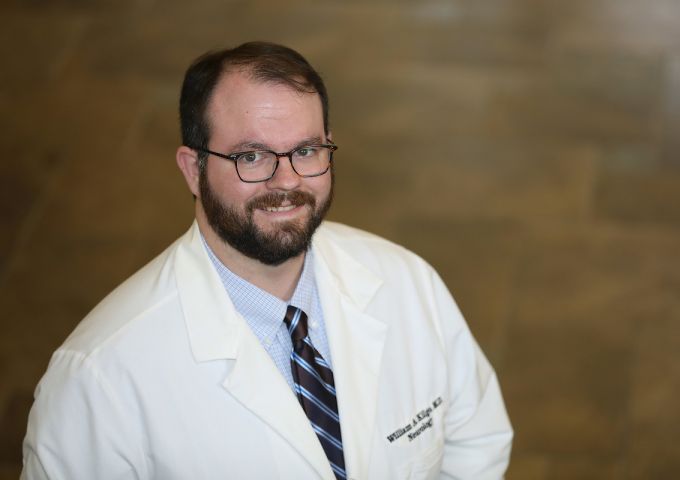
‘Chemo Sabes’ donate time, provide comfort for cancer patients
“Our Chemo Sabe volunteers astound me with their dedication, not just to patients but to the staff as well,” said Susan Crutchfield, community and physician outreach manager at the Mitchell Cancer Institute. “They seem to lift everyone’s spirits when there, and they have a reciprocal caring relationship with staff.”
By Carol McPhail
[email protected]
Snacks. Blankets. A listening ear. These are some of the ways volunteers put patients at ease in the infusion suite at the USA Health Mitchell Cancer Institute.
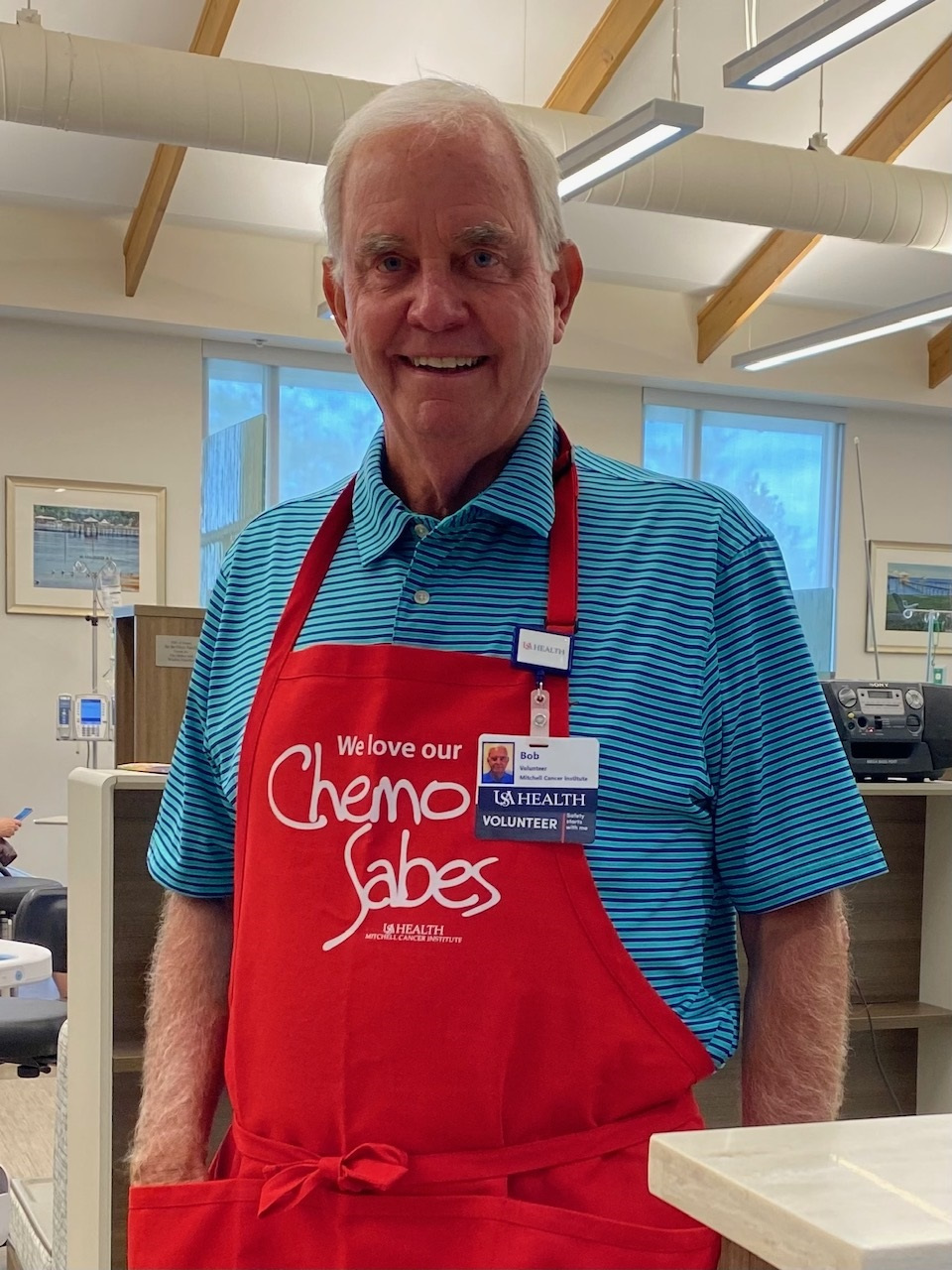
“I see some patients who have a lot of fear, and I completely understand,” said Bob McKean, a member of the MCI Volunteer Auxiliary and a pancreatic cancer survivor. “I’ve been there.”
McKean, who is retired from the banking industry, is one of 43 volunteers — and only five men — who provide comfort to cancer patients during the hours they spend receiving intravenous chemotherapy. They offer drinks, snacks, blankets and pillows. They also are there for patients who just want to talk.
The MCI volunteers are called “Chemo Sabes,” a spinoff of the term “ke-mo sah-bee” from The Lone Ranger series. Roughly translated as “faithful friend” or “trusty scout,” the term was Tonto’s name for his masked friend.
“Our Chemo Sabe volunteers astound me with their dedication, not just to patients but to the staff as well,” said Susan Crutchfield, MCI community and physician outreach manager, who coordinates the volunteers. “They seem to lift everyone’s spirits when there, and they have a reciprocal caring relationship with staff.”
McKean commutes more than an hour each way to Fairhope for his Monday afternoon shift. At first, he wasn’t sure he would be comfortable volunteering in a cancer center, having received multiple chemo treatments for pancreatic cancer in Birmingham. But ultimately, he found his experience to be an asset. McKean recalled chatting with a patient who said she was getting chemo for the first time. “I told her, ‘There’s an end to this. You can make it through,’” he said. “It makes a difference when you’ve been down that road.”
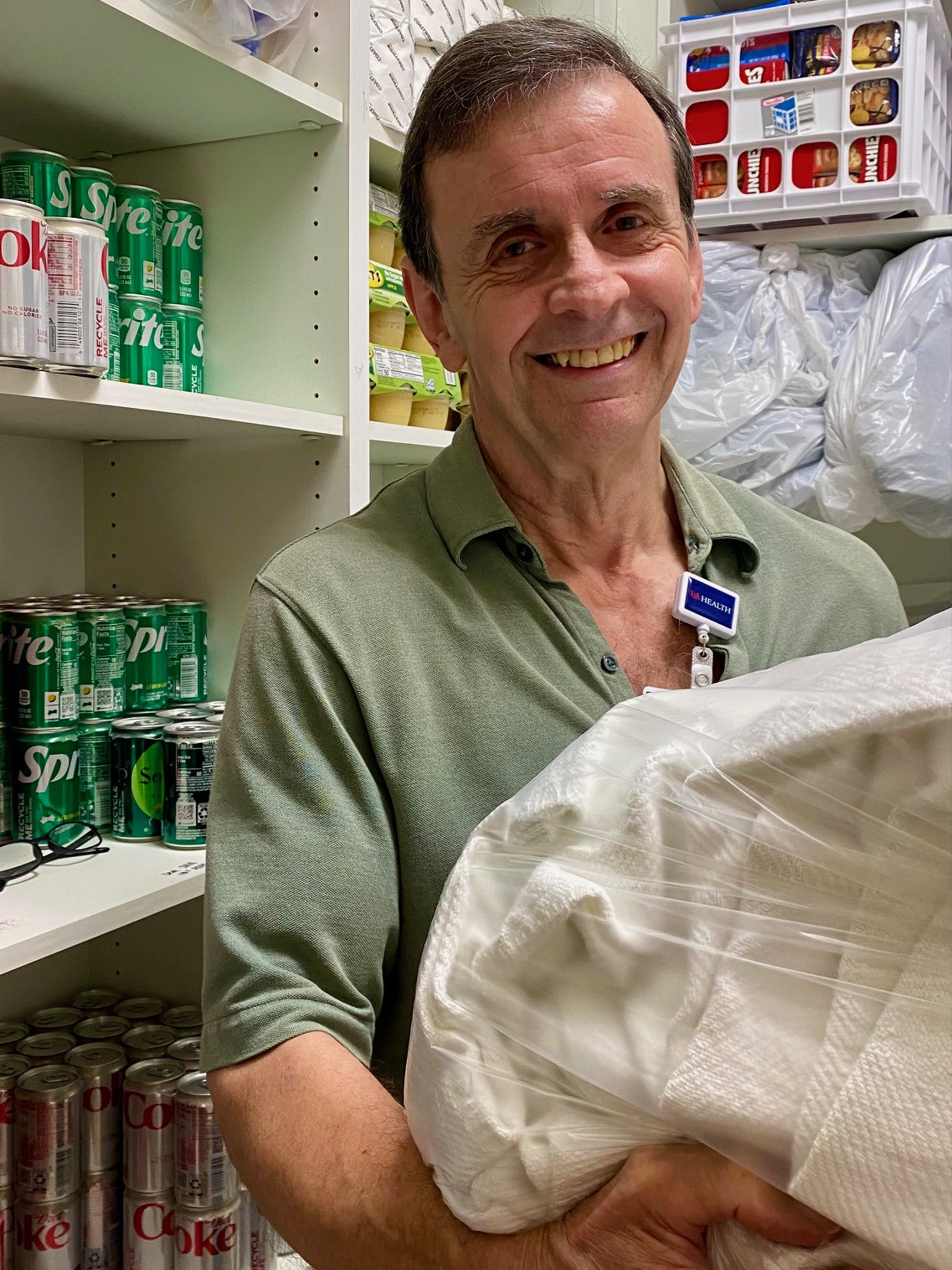
Randy Best began volunteering at the Mitchell Cancer Institute in Fairhope in 2018, a year after his wife, Margy, died from cancer. The MCI’s main waiting area is dedicated to Margy and bears her photo, thanks to support from the Fairhope Single Tax Corp., where she worked for 42 years.
Since 2018, Best has clocked more than 1,000 volunteer hours. He explains his motivation this way: “You feel that your efforts are providing a needed service, and the other part of that equation is that you get more than you give, so it’s a win-win,” he said.
Each week, Best takes on whatever tasks need doing to keep things clean, orderly and organized. “But my primary priority is to the patients and their care and comfort,” he said. “I go in there knowing that the patients are there because they are in a less-than-ideal situation, but you see the care that they receive, the laughter, the camaraderie. They give life there, and it is a good thing to witness.”
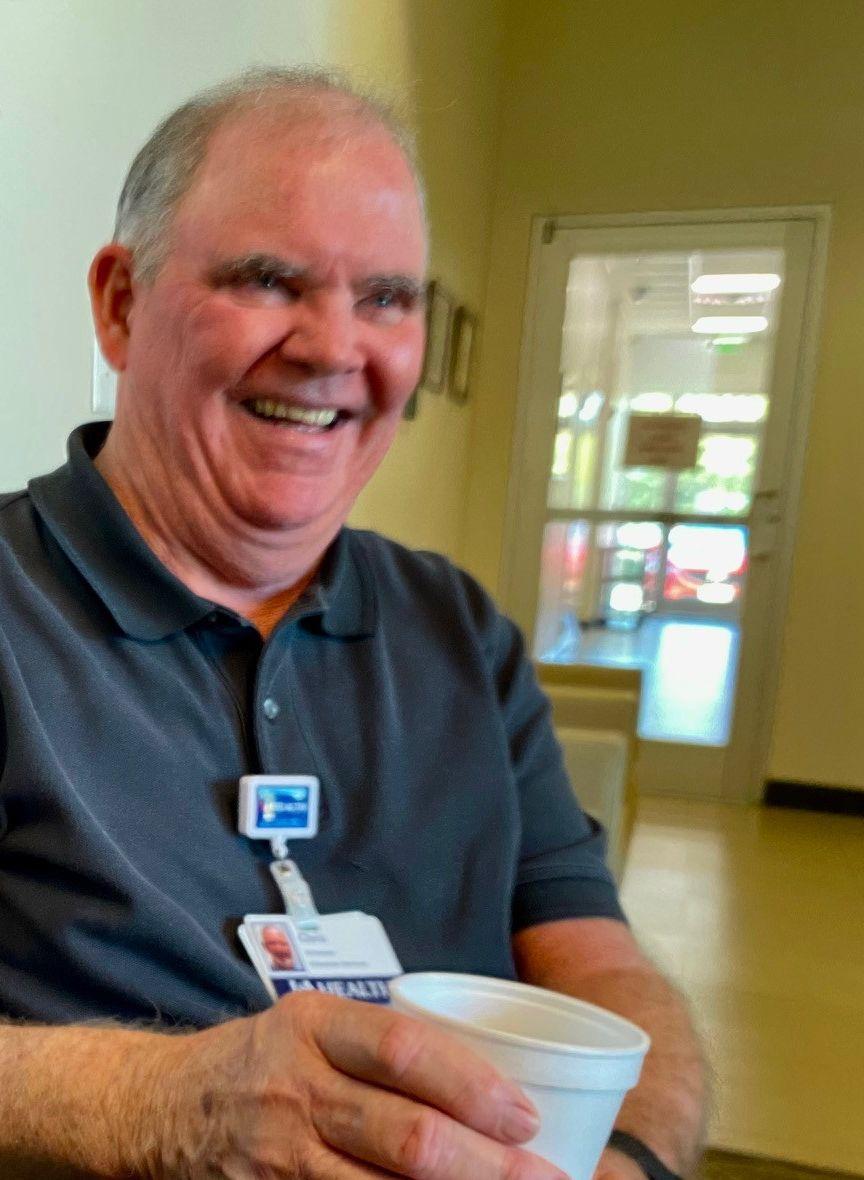
Chris Fogarty volunteers on Thursday mornings at the MCI in Fairhope, where he was treated for prostate cancer. He also serves on the Community Advisory Council for the MCI. The former banker especially enjoys using his people skills to connect with the patients, and he has found them very grateful for the interaction. “It’s so important in engaging with people to call them by name,” he said. “I’ll introduce myself as a volunteer and say, ‘My name is Chris.’ A lot of times, they’ll offer their first name too.”
If Fogarty knows, for instance, that a patient is nervous about getting an IV, he will try to ease their anxiety. “I go over and engage them in conversation,” he said. “They don’t dwell on that while we’re talking.”
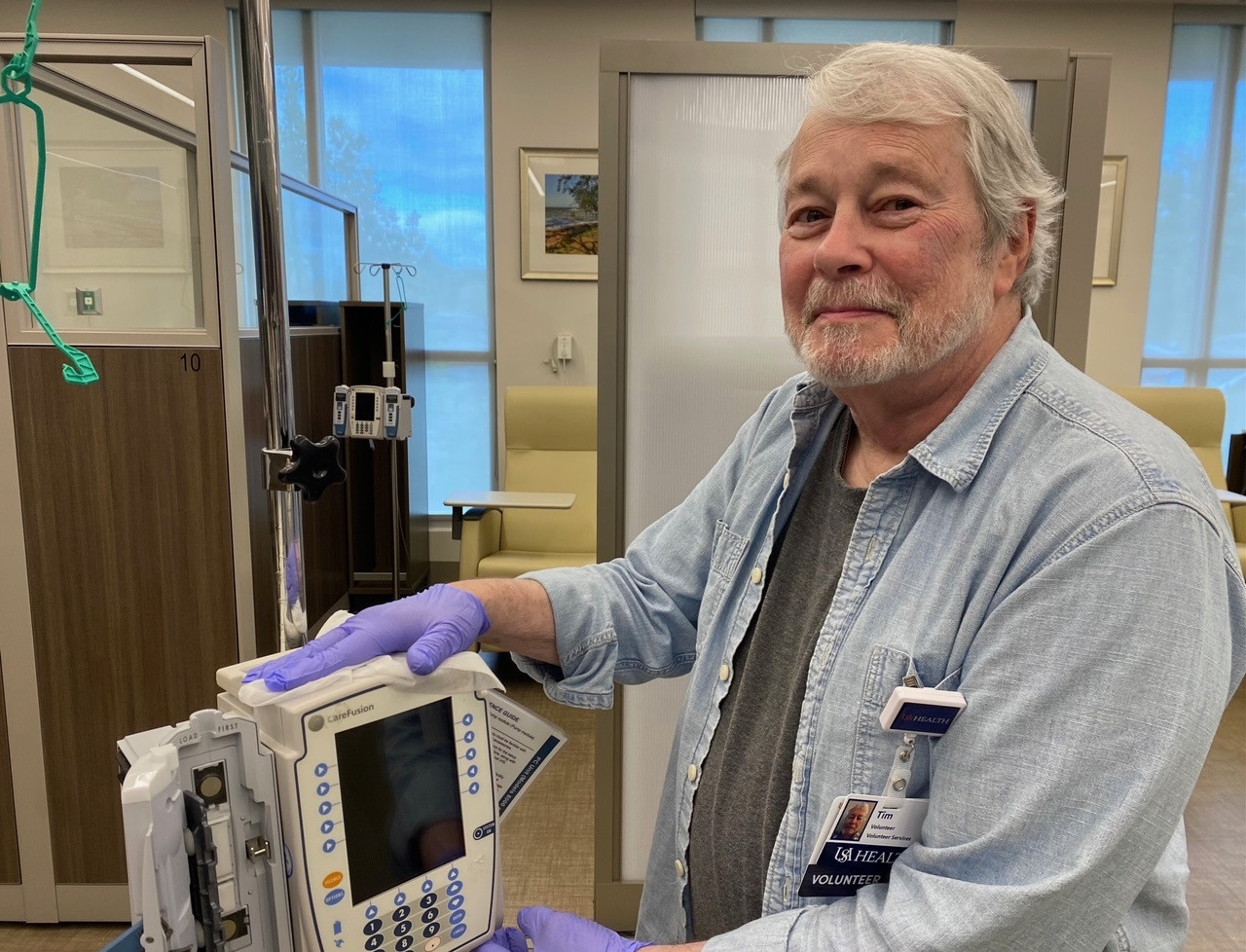
For Tim Corrigan, the desire to volunteer is rooted in his upbringing and Jesuit education. “One of the emphases of Jesuit spirituality and education is that it should produce ‘men and women for and also with others,’” he said. “Being a volunteer at MCI provides a perfect way to put that into practice.”
Corrigan and his wife, Cathie, volunteer together, and both have been treated for cancer. “Having cancer and having family and friends go through it makes having a chance to do something to help an easy choice,” he said. “The patients’ courage, patience and positive outlooks, and the nurses’ compassion, good humor and professionalism are inspiring.”
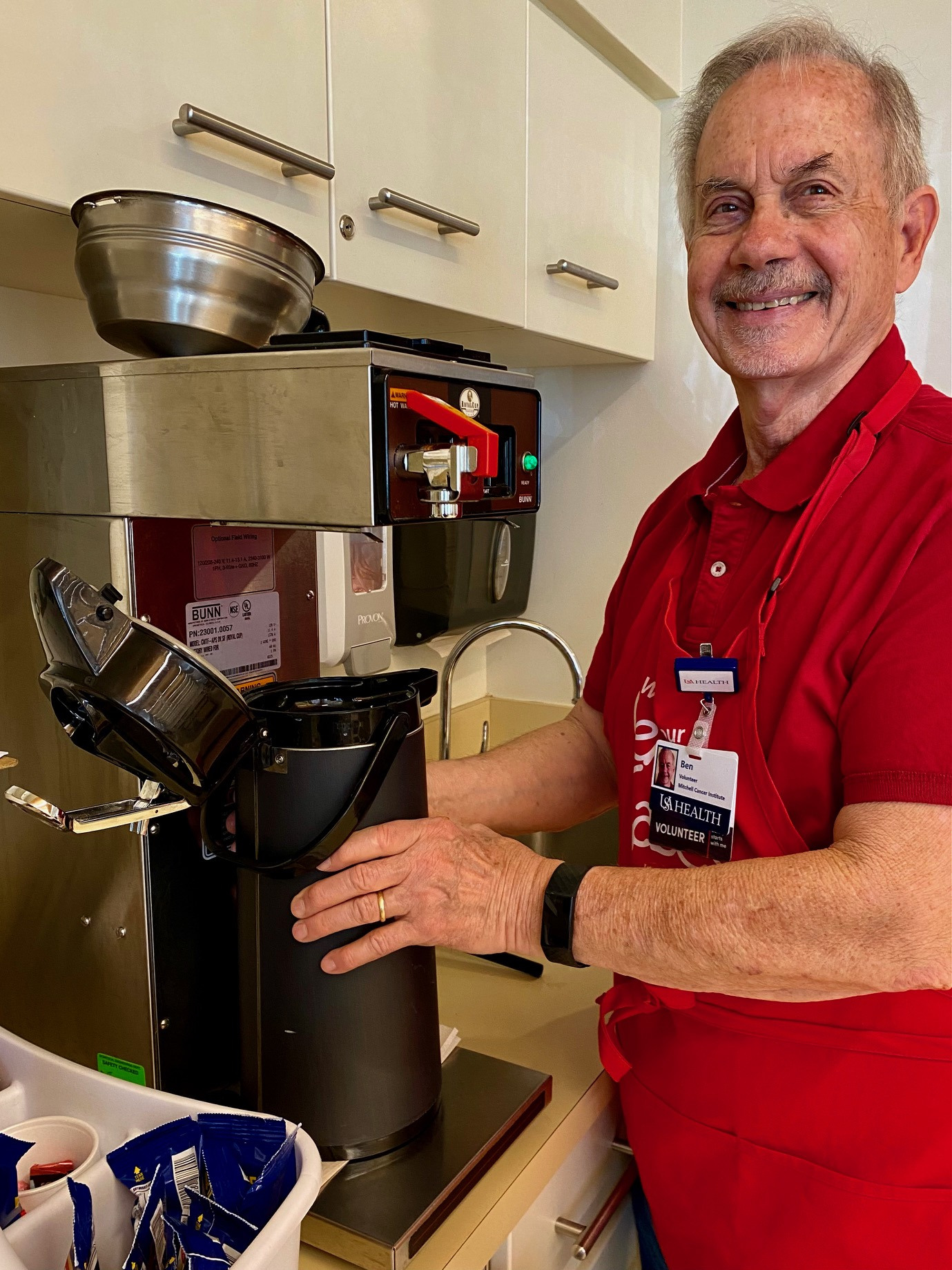
Ben Purvis, who volunteers as a Chemo Sabe at the MCI in Mobile, also had praise for the staff. “The nurses really care about their patients. You can see it in how they talk and relate to them,” said Purvis, who was treated for cancer in 2017. “One of the nurses wears different funny hats and glasses to cheer them up and connect with them.”
During his volunteer time, he tackles tasks such as cleaning stations after a patient leaves, keeping snacks and drinks stocked, and making coffee. His favorite part, though, is talking with the patients as they receive their life-saving medication and making their treatment a little less stressful. “They have such positive attitudes,” he said. “They make my day.”
If you are interested in becoming an adult volunteer at the Mitchell Cancer Institute, visit our volunteer webpage to apply and get more information.


